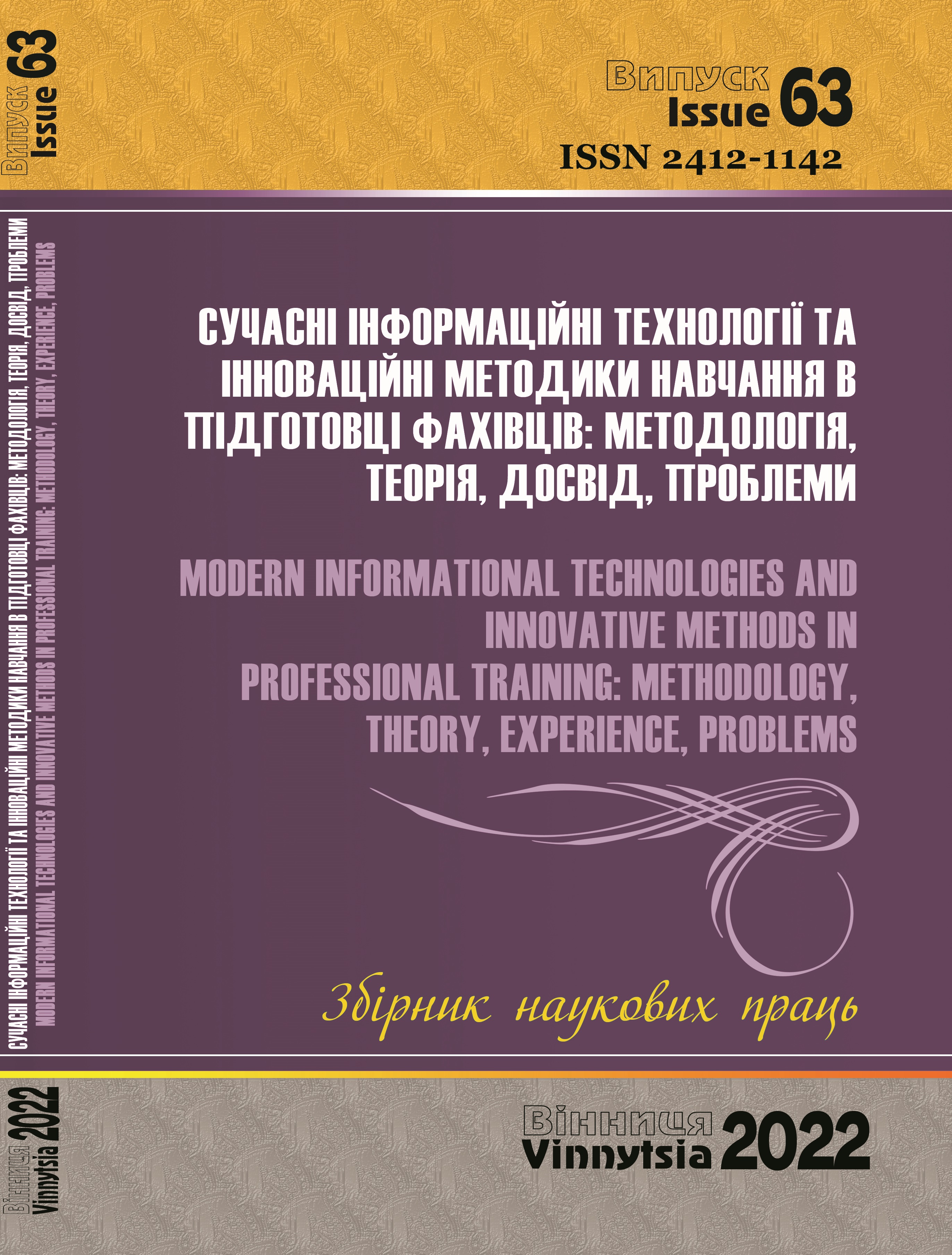PREPARATION OF FUTURE PRIMARY AND CLASS TEACHERS FOR THE FORMATION OF SOFT SKILLS CHILDREN BY MEANS OF THEATER ART
DOI:
https://doi.org/10.31652/2412-1142-2022-63-78-87Keywords:
project, primary school teacher, art teacher, soft skills, theatrical art, theatrical activityAbstract
The article raises an important issue of reforming the higher education system, the introduction
of innovative teaching technologies in the educational process of higher pedagogical universities. The
characteristic tendencies in the development of the society are outlined, the important problems of the
present are clarified, the needs of the labor market are studied, the directions of solving the problem of soft
skills formation of pupils and children by means of theatrical activity are determined. The method of
projects is recognized as an innovative tool for preparing future teachers for the formation of soft skills of
students and children by means of theatrical activities. It has been found that the profession of primary
school and art teacher is associated with all sorts of tense situations that have both positive and negative
undertones. Pedagogical creativity is recognized as the basis of teacher success. The list of soft skills of
future teachers is determined: creative thinking, emotional intelligence, efficient use of resources and
effective communication, teamwork. These skills are considered vital for pupils and students. Theatrical
art is chosen as a means of developing soft skills. The definition of the concept of theatrical activity is
given.
The results of a survey of teachers-practitioners and students of 3-4 grades are presented, which helped to
identify the contradictions in the system of Ukrainian education. The course of implementation in the
educational process of Vinnytsia State Pedagogical University named after Mykhailo Kotsyubynsky of the
Erasmus + project (Jean Monnet Module) 620252-EPP-1-2020-1-UA-EPPJMO-MODULE “EU
experience of soft skills development of preschool and primary school-age children by theater activities in
teacher training ». The study does not cover all aspects of this problem. Further research is needed to
develop integrated educational programs, work on the creation of a third generation university.
Downloads
References
Система засобів ефективного впливу на емоційний розвиток дітей. URL: https://emotsijno-osobistisnij-
rozvitok-ditej-v-umovakh-sim-ji.webnode.com.ua/sistema-zasobiv-efektivnogo-vplivu-na-emotsijnij-rozvitok-
ditej-doshkilnogo-viku
Нова українська школа: концептуальні засади реформування середньої школи (2016). URL:
https://mon.gov.ua/storage/app/media/zagalna%20serednya/nova-ukrainska-shkola-compressed.pdf.
Лазаренко Н.І. (2019) Професійна підготовка вчителів у педагогічних університетах України в умовах
євроінтеграції: монографія. Вінниця : ТОВ «Друк». 389 с.
Андрущенко Т.В. (2016) Ціннісна палітра європейського простору освіти (український вимір). Науковий
часопис. нац. пед. ун ту ім. М.П. Драгоманова. Серія 12, Психологічні науки. Вип. 4. С. 107 – 111.
Mozgalova, N.G., Baranovska, I.G., Hlazunova, I.K., Mikhalishen, A.V., & Kazmirchuk,N.S. (2021).
Methodological foundations of soft skills of musical art teachers in pedagogical institutions of higher education.
Linguistics and Culture Review, 5(S2), 317- 327. https://doi.org/10.37028/lingcure.v5nS2.1355
Демченко О. (2021) Європейські орієнтири у підготовці майбутніх педагогів до використання театру в
соціально-виховній роботі. Актуальні проблеми формування творчої особистості педагога в контексті
наступності дошкільної та початкової освіти : збірник матеріалів V Міжнародної науково-практичної
Інтернет-конференції (Вінниця, ВДПУ імені Михайла Коцюбинського, 22-23 квітня 2021 р.) / за ред.
О.А.Голюк ; Вінницький державний педагогічний університет імені Михайла Коцюбинського, факультет дошкільної і початкової освіти імені Валентини Волошиної. Вінниця: ТОВ «Меркьюрі-Поділля, 2021. Вип. 10. С.467-471.
Жовнич О., Стахова І. Підготовка майбутніх педагогів до використання театральної діяльності у соціально-
виховній роботі: європейський контекст. Актуальні проблеми формування творчої особистості педагога в контексті наступності дошкільної та початкової освіти : збірник матеріалів V Міжнародної науково-
практичної Інтернет-конференції (Вінниця, ВДПУ імені Михайла Коцюбинського, 22-23 квітня 2021 р.) /
за ред. О.А.Голюк ; Вінницький державний педагогічний університет імені Михайла Коцюбинського, факультет дошкільної і початкової освіти імені Валентини Волошиної. Вінниця: ТОВ «Меркьюрі-Поділля», 2021. Вип. 10. С. 479-483.
Титаренко Т. (2013) Сучасна психологія особистості. 238 с
Макаренко Л. (2008) Все про театр і дитячу театралізовану діяльність. 128 с.
Шахрай В. М. (2011) Театральне мистецтво як чинник оптимізації взаємодії особистості та соціуму.
Народна освіта: електрон. наук. фахове вид. 2011. Вип. No 1 (13). URL: http://narodnaosvita.kiev.ua/
Narodna_osvita/vupysku/13/statti/shahrai.ht82
Downloads
Published
Issue
Section
License
Copyright (c) 2022 Ірина Барановська, Олена Демченко, Оксана Граб

This work is licensed under a Creative Commons Attribution 4.0 International License.





